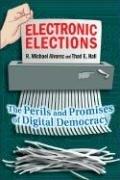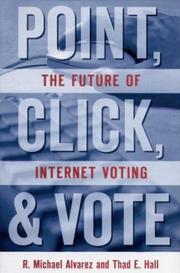| Listing 1 - 9 of 9 |
Sort by
|
Book
ISBN: 9781107107885 9781107518414 9781316257340 1107107881 1107518415 1316257347 1316530566 1316532240 Year: 2016 Publisher: Cambridge Cambridge University Press
Abstract | Keywords | Export | Availability | Bookmark
 Loading...
Loading...Choose an application
- Reference Manager
- EndNote
- RefWorks (Direct export to RefWorks)
Quantitative research in social science research is changing rapidly. Researchers have vast and complex arrays of data with which to work: we have incredible tools to sift through the data and recognize patterns in that data; there are now many sophisticated models that we can use to make sense of those patterns; and we have extremely powerful computational systems that help us accomplish these tasks quickly. This book focuses on some of the extraordinary work being conducted in computational social science - in academia, government, and the private sector - while highlighting current trends, challenges, and new directions. Thus, Computational Social Science showcases the innovative methodological tools being developed and applied by leading researchers in this new field. The book shows how academics and the private sector are using many of these tools to solve problems in social science and public policy.
Social sciences --- Data processing --- Mathematical models --- Methodology --- Methods in social research (general) --- Data processing. --- Mathematical models. --- Methodology.
Multi
ISBN: 9780691220192 Year: 2020 Publisher: Princeton, N.J. Princeton University Press
Abstract | Keywords | Export | Availability | Bookmark
 Loading...
Loading...Choose an application
- Reference Manager
- EndNote
- RefWorks (Direct export to RefWorks)
Multi
ISBN: 9781400834679 9780691154350 1400834678 069115435X 9780691143057 0691143056 1282531565 9781282531567 Year: 2010 Publisher: Princeton, N.J. Princeton University Press
Abstract | Keywords | Export | Availability | Bookmark
 Loading...
Loading...Choose an application
- Reference Manager
- EndNote
- RefWorks (Direct export to RefWorks)

ISBN: 1282531468 9786612531460 1400834082 9781400834082 0691146225 9780691146225 0691125171 9780691125176 9780691146225 9781282531468 6612531460 Year: 2008 Publisher: Princeton, N.J. : Princeton University Press,
Abstract | Keywords | Export | Availability | Bookmark
 Loading...
Loading...Choose an application
- Reference Manager
- EndNote
- RefWorks (Direct export to RefWorks)
Since the 2000 presidential election, the United States has been embroiled in debates about electronic voting. Critics say the new technologies invite tampering and fraud. Advocates say they enhance the accuracy of vote counts and make casting ballots easier--and ultimately foster greater political participation. Electronic Elections cuts through the media spin to assess the advantages and risks associated with different ways of casting ballots--and shows how e-voting can be the future of American democracy. Elections by nature are fraught with risk. Michael Alvarez and Thad Hall fully examine the range of past methods and the new technologies that have been created to try to minimize risk and accurately reflect the will of voters. Drawing upon a wealth of new data on how different kinds of electronic voting machines have performed in recent elections nationwide, they evaluate the security issues that have been the subject of so much media attention, and examine the impacts the new computer-based solutions is having on voter participation. Alvarez and Hall explain why the benefits of e-voting can outweigh the challenges, and they argue that media coverage of the new technologies has emphasized their problems while virtually ignoring their enormous potential for empowering more citizens to vote. The authors also offer ways to improve voting technologies and to develop more effective means of implementing and evaluating these systems. Electronic Elections makes a case for how e-voting can work in the United States, showing why making it work right is essential to the future vibrancy of the democratic process.
Voting-machines --- Electronic voting --- Ballot --- Elections --- E-voting --- eVoting --- Voting --- Reliability. --- Security measures --- Equipment and supplies --- #SBIB:324H42 --- Reliability --- Politieke structuren: verkiezingen --- Political systems --- Computer. Automation --- United States --- United States of America

ISBN: 0815703686 0815703694 Year: 2004 Publisher: Washington, D.C. Brookings Institution
Abstract | Keywords | Export | Availability | Bookmark
 Loading...
Loading...Choose an application
- Reference Manager
- EndNote
- RefWorks (Direct export to RefWorks)

ISBN: 9781400834082 9780691125176 1400834082 0691146225 9780691146225 1282531468 9781282531468 9786612531460 6612531460 0691125171 9780691146225 Year: 2008 Publisher: Princeton, N.J. Princeton University Press
Abstract | Keywords | Export | Availability | Bookmark
 Loading...
Loading...Choose an application
- Reference Manager
- EndNote
- RefWorks (Direct export to RefWorks)
Political sociology --- Politics --- Electronic voting --- Voting-machines --- Security measures --- Reliability --- Political systems --- Computer. Automation --- United States of America
Book
ISBN: 9780815701385 Year: 2008 Publisher: Washington, D.C. Brookings Institution Press
Abstract | Keywords | Export | Availability | Bookmark
 Loading...
Loading...Choose an application
- Reference Manager
- EndNote
- RefWorks (Direct export to RefWorks)
Digital
ISBN: 9780080535609 0080535607 1281035971 9781281035974 Year: 1998 Publisher: New York, NY Pergamon
Abstract | Keywords | Export | Availability | Bookmark
 Loading...
Loading...Choose an application
- Reference Manager
- EndNote
- RefWorks (Direct export to RefWorks)
Digital

ISBN: 9783112495346 9783112495339 Year: 2022 Publisher: Berlin ;; Boston De Gruyter
Abstract | Keywords | Export | Availability | Bookmark
 Loading...
Loading...Choose an application
- Reference Manager
- EndNote
- RefWorks (Direct export to RefWorks)
| Listing 1 - 9 of 9 |
Sort by
|

 Search
Search Feedback
Feedback About UniCat
About UniCat  Help
Help News
News